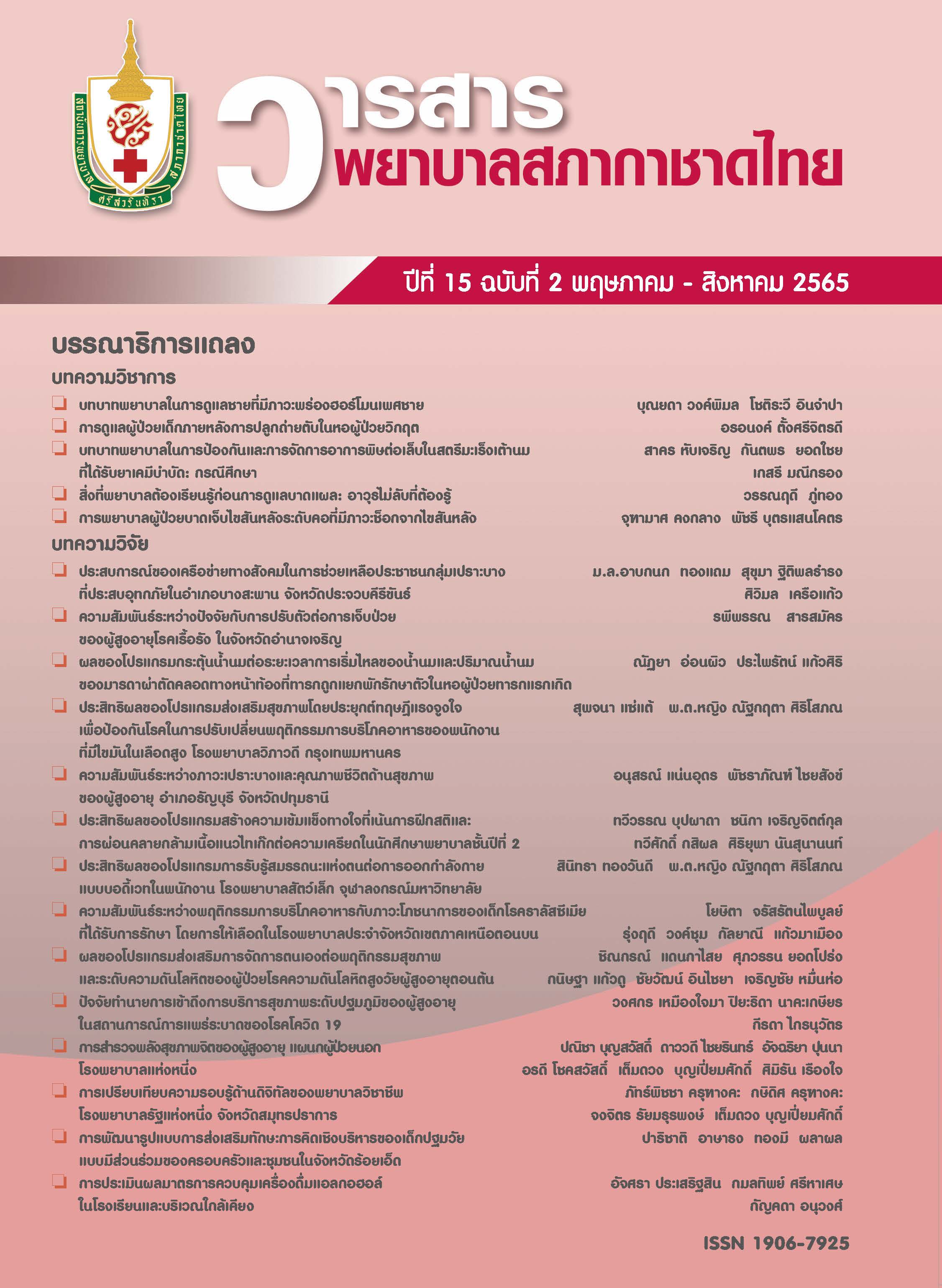The Effectiveness of Resilience Enhancing Program with Mindfulness based on Stress Reduction and Tai Chi Muscle Relaxation Among Second Year Nursing Students
Keywords:
stress, nursing students, resilience, mindfulness, Tai ChiAbstract
The quasi-experimental research aimed to compare 1) stress in students before and after receiving the resilience-enhancing program with mindfulness based on stress reduction and Tai Chi muscle relaxation 2) stress in nursing students who received the resilience-enhancing program with mindfulness based on stress reduction and Tai Chi muscle relaxation, and those who participated in routine university activities. The subjects were 46 second year university nursing students who met the inclusion criteria and who were randomly assigned to the experiment group and control group. Research instruments consisted of the resilience quotient-enhancing program with mindfulness based on stress reduction and Tai Chi muscle relaxation and the Suanprung Stress Test-20. Data were analyzed by descriptive statistics and inferential statistics. The major finding were as follows: 1) Stress in the experiment group was significantly lower, at the .01 level after receiving the resilience enhancing program with mindfulness based on stress reduction and Tai Chi muscle relaxation, 2) Stress in experiment group was significantly lower than the control group at the .01 level.
Conclusion: The resilience-enhancing program with mindfulness based on stress reduction and Tai Chi muscle relaxation is the one choice of alternative therapies. It could be used to reduce nursing students’ stress levels by increasing meditation and self-awareness and strengthen the mind to face modern stressors.
References
Alsaqri SH. Stressors and coping strategies of the Saudi nursing students in the clinical training: a cross-sectional study. Educ Res Int [Internet]. 2017 [cited 2021 Aug 23];4018470 Available from: https://downloads.hindawi.com/journals/edri/2017/ 4018470.pdf
Lazarus RS, Folkman S. Transactional theory and research on emotions and coping. Eur J Pers 1987;1(3):141-69.
Pulido-Martos M, Augusto-Landa JM, Lopez-Zafra E. Sources of stress in nursing students: a systematic review of quantitative studies. Int Nurs Rev 2011;59(1):15–25.
Labrague LJ, McEnroe-Petitle DM, De Los Santos JAA, Edet OB. Examining stress perceptions and coping strategies among Saudi nursing students: a systematic review. Nurse Educ Today 2018;65:192-200.
Buppata T. An annual report: a survey of the 2nd years nursing students experiences of stress in Huachiew Chalermprakiet University. Samut Prakarn: Huachiew Chalermprakiet University; 2018. (in Thai)
Limthongkul M, Aree-Ue S. Sources of stress, coping strategies, and outcomes among nursing students during their initial practice. Rama Nurs J 2009;15(2):193-205. (in Thai)
Klainin-Yobas P, Keawkerd O, Pumpuang W, Thunyadee C, Thanoi W, He HG. The mediating effects of coping on the stress and health relationships among nursing students: a structural equation modelling approach. J Adv Nurs 2014;70(6):1287-98.
Luthans F, Youssef CM.Emerging positive organizational behavior.J Manag 2007;33(3):321-49. doi: 10.1177/0149206307300814
Grotberg EH. Resilience for tomorrow [Internet]. 2005 [cited 2019 Aug 10]. Available from: http://resilnet.uiuc.edu/ library/grotberg2005_resilience-for-tomorrow-brazil.pdf.
Kabat-Zinn J. Full catastrophe living how to cope with stress, pain and illness using mindfulness meditation. London: Little, Brown Book Group; 2013.
Kabiri DS, Mehrabi T. Sadeghi R. The effect of Tai Chi exercise on stress, anxiety, depression, and self confidence of nursing students. Jundishapur J Chronic Dis Care [Internet]. 2019 [cited 2021 Jan 21];8:e92854. Available from: https://sites.kowsarpub. com/jjcdc/articles/92854.html
Polit DF. Data analysis & statistics for nursing research. New York: Appleton & Lange; 1996.
Mahatnirunkul S, Pumpaisanchai W, Tapanya P. The construction of Suan Prung Stress Test for Thai population. Journal of Suanprung Psychiatric Hospital 1997;13(3):1-20. (in Thai)
Kang YS, Choi SY, Ryu E. The effectiveness of a stress coping program based on mindfulness meditation on the stress, anxiety, and depression experienced by nursing students in Korea. Nurse Educ Today 2009;29(5):538-43.
Chiangkuntod S. The development of stress management program following Buddhist psychology for nursing students at Faculty of Nursing, Siam University. Journal of Graduate Studies Review 2017;15(1):184-95. (in Thai)
Centeno RPR, Fernandez KTG. Effect of mindfulness on empathy and self-compassion: an adapted MBCT program on Filipino college students. Behav Sci 2020;10(3):61. doi: 10.3390/bs10030061.
Galante J, Dufour G, Vainre M, Wagner AP, Stochl J, Benton A, et al. A mindfulnessbased intervention to increase resilience to stress in university students (the Mindful Student Study): a pragmatic randomised controlled trial. Lancet Public Health 2018;3(2):e72-e81. doi: 10.1016/S2468-2667(17)30231-1.
Downloads
Published
Issue
Section
License
Copyright (c) 2022 Srisavarindhira Thai Red Cross Institute of Nursing

This work is licensed under a Creative Commons Attribution-NonCommercial-NoDerivatives 4.0 International License.
เนื้อหาบทความหรือข้อคิดเห็นต่างๆ ในวารสารพยาบาลสภากาชาดไทยนี้ เป็นความคิดเห็นของผู้เขียนบทความ ไม่ใช่ความเห็นของกองบรรณาธิการ หรือสถาบันการพยาบาลศรีสวรินทิรา สภากาชาดไทย






